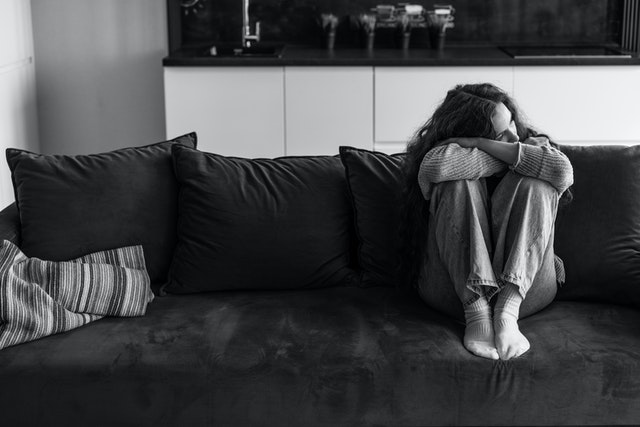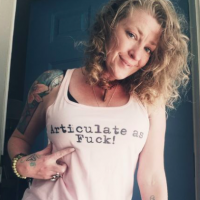A huge, warm hug envelops me, and I start to melt.
Quite the contrast to the cold internal constriction I have been living with for weeks or, more accurately, months.
My friend sweeps across the threshold of my tin cottage, her long, dark hair swinging, two bottles of wine in tow. We are going to mourn, toast, and celebrate the recent loss of my pug, Grom, together.
Immediately she has tears in her golden, empathetic eyes. She cannot imagine the loss I am dealing with and because it has been so long since we have talked or seen each other (and I was super private about it), she doesn’t even yet know about the unexpected pregnancy and abortion that I went through.
As she pours pink libations, I suddenly realize that I have not even put the dishes away since I got home from my two-week road trip. The counter is cluttered with coffee cups and soup bowls because that is all I have been consuming.
Embarrassed, I find myself apologizing for my messy home, as the reality of my own self-neglect sets in.
I had been slumming in a bathrobe right up until she arrived only to slip into some leggings, a sports bra, and a loose button-down shirt seconds before the doorbell rang. She waves it off and offers to help with the dishes. I decline, but in retrospect, I rather wish I had accepted.
Why is it so hard to allow people to help us when we are grieving? Maybe we feel there’s nothing wrong. Maybe we feel we don’t deserve it.
In the weeks that I have been riding these waves, my laundry and recycling have piled up as well as my dishes. Looking around, I notice dust bunnies crowding in the corners along with dead leaves, which my plants have shed. I need to clean. I don’t want to.
Whilst staying with my bestie in Albuquerque, I had sunk into a pit of depression for about 24 hours, maybe a bit more. It was awful.
I found myself piling shame on top of sadness.
“What is wrong with me?” I wondered as I sank into his couch and shied from his care. I kept retreating to his bathtub in an attempt to soak away my discomfort. My digestion froze. My back went out. In his unrelenting kindness, he had his massage therapist come to his house to treat me.
We drank wine and reminisced about Grom, my now dead dog. I shared about my process with my pregnancy—which I had not kept. We talked about my relationship’s growing pains. We talked about his angst at living in a new city.
We talked and talked. We went out and stayed in. And I felt like a sh*t. Why? Because I was grieving, and I was grieving in a way that—for someone who sits with grief for a living—was unfamiliar and utterly destabilizing for me.
I have sat with many women who were—sometimes years after the event—still grieving a lost pregnancy, be it a miscarriage or an abortion. I was deeply empathetic with their pain and helpful in their healing, but I had no idea what it was really like until I went through it.
It’s unnerving how much we can hurt while letting go of something even when we know we do not want it. Knowing we are doing the right thing does very little to ease the ache of loss
There is the pain of a planned loss and then there is the shock to our system when a being we love is suddenly taken.
I had witnessed the slow deterioration of my dog over the last few months, but I was intensely shaken when he unexpectedly had a stroke. By the next morning, it was apparent that he wouldn’t recover. I called a vet to come to my home to help ease his passing.
Then I received his ashes.
I was coming home from having a soak at the hot springs, followed by a drink with a friend. As I walked up my steps, I sensed Grom’s presence for the first time since his death—as if he was just on the other side of the door. I retrieved a small gift bag and carried it inside. Upon unpacking it by the soft light that graced my kitchen table, I discovered a small hardwood box containing his ashes as well as several condolence cards.
I turned the box over in my hands and let the weight of all that was left of my beloved furry friend sink in. Then I bawled.
It is the body that we miss when someone dies or even when they leave our life.
Their essence lives on in our hearts and minds and maybe other realms as well, but the body is gone and we can no longer hold it, be held, or hear its breathing. The loss of our ability to touch and take visceral comfort in a being’s physical presence is the essence of grief.
The little paw impression that the vet had made before taking his body away is now sitting on the table next to that box. I had taken a ballpoint pen when the clay was still wet and carefully impressed GROM around the small foot.
My beautiful friend touched it tenderly as we lifted our glasses to him. Her dog is approaching that age as well. Tears sprang to her lively eyes as she described her own dog’s body now covered in tumors and lamented how she would not know what to do without him.
I empathize completely. Even contemplating loss of such magnitude can keep us from opening our hearts—can keep us from even ever knowing a love that could change us.
The grief of what we have not known is a mysterious ache that can drive us to do strange things in an attempt to fill what can feel like an alien and terrifying absence.
I know this one, too. I have, at 41 years old, yet to truly be embraced in romantic partnership.
I have touched that place of care with another human—a man who I wish to offer my entire being to. We have rolled around in it between the sheets, limbs entwined, breath mingling, flesh afire while our souls dance.
We have talked and texted our way through, around, and possibly out of that holy place and the interruption to that love hurts just as bad as any physical death.
In our lives, we will mourn many things: the loss of love, the ache of absence, and the burn of betrayal. We will grieve not only death, but being torn from homes we love, from lands that nurture us, and from people whom we would have died for.
In spite of the pain, the ache, the missing, crying, hurting, and yearning—what choice do we have but to go on loving?
~












Read 9 comments and reply